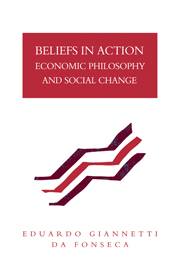Book contents
- Frontmatter
- Contents
- Preface and acknowledgements
- List of abbreviations
- PART I THE WAR OF IDEAS
- PART II PATTERNS OF MISUNDERSTANDING
- 8 Understanding misunderstandings The intergenerational transmission of ideas and the time–factor
- 9 Contracts and traps Bacon's contract of error and the notion of pure misunderstanding
- 10 On the misuse of language Ordinary language, formalism and the false–security pitfall
- 11 Errors and illusions Francis Bacon on the sub–rational determinants of belief
- 12 The protection of belief Pure misunderstanding as the result of theoretical akrasia
- 13 On misunderstanding Malthus The reception of the Essay on Population: critics and supporters
- 14 Ideas into Politics, I The transmission of abstract thought: three levels of exchange
- 15 Ideas into politics, II Sweeping claims, the philosopher–king and pure misunderstandings
- Conclusion to part II
- Notes
- Bibliography
- Index
12 - The protection of belief Pure misunderstanding as the result of theoretical akrasia
Published online by Cambridge University Press: 03 April 2010
- Frontmatter
- Contents
- Preface and acknowledgements
- List of abbreviations
- PART I THE WAR OF IDEAS
- PART II PATTERNS OF MISUNDERSTANDING
- 8 Understanding misunderstandings The intergenerational transmission of ideas and the time–factor
- 9 Contracts and traps Bacon's contract of error and the notion of pure misunderstanding
- 10 On the misuse of language Ordinary language, formalism and the false–security pitfall
- 11 Errors and illusions Francis Bacon on the sub–rational determinants of belief
- 12 The protection of belief Pure misunderstanding as the result of theoretical akrasia
- 13 On misunderstanding Malthus The reception of the Essay on Population: critics and supporters
- 14 Ideas into Politics, I The transmission of abstract thought: three levels of exchange
- 15 Ideas into politics, II Sweeping claims, the philosopher–king and pure misunderstandings
- Conclusion to part II
- Notes
- Bibliography
- Index
Summary
The method of tenacity described by Peirce and the propensity to selfdeception reported (and diligently resisted) by Darwin are both ways to keep our relevant beliefs safe from the brunt of unfavourable or just unfavourable–looking matter. Their common denominator is the notion of avoidance. In the one case this is achieved by the methodical looking away from what might damage the soothing illusion at issue, and in the other by our spontaneous tendency to skip from, undervalue and erase from the field of awareness facts and thoughts which prove uncomfortable to dwell upon. Both mechanisms bring out the involvement of the thinking subject's desires and emotions in the process of belief–formation – they show how this interference may affect the workings of the understanding and hence impair cognition.
These mechanisms for the protection of belief can be seen as instances of what has been recently described, in more general terms, as the phenomenon of ‘theoretical akrasia’: ‘We notice or allege a case of theoretical akrasia whenever we speak of refusing to see, of not wanting to know, and in at least some of the cases where we accuse someone of self–deception, or of living in a fool's paradise’. The term akrasia here, it may be noted, is borrowed from Aristotle's ethics, where it is used to refer to the failure, by an individual agent, to act in line with his own opinion about what he should do when the time to act comes.
- Type
- Chapter
- Information
- Beliefs in ActionEconomic Philosophy and Social Change, pp. 160 - 166Publisher: Cambridge University PressPrint publication year: 1991



